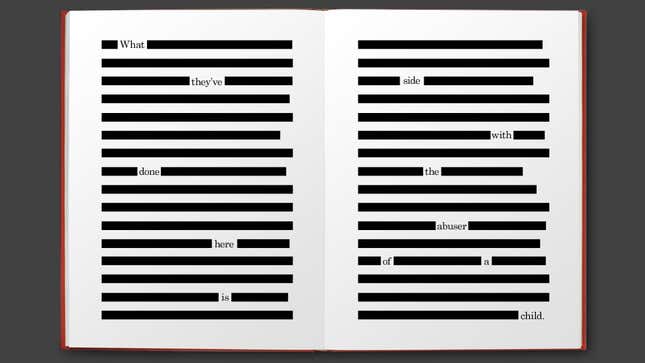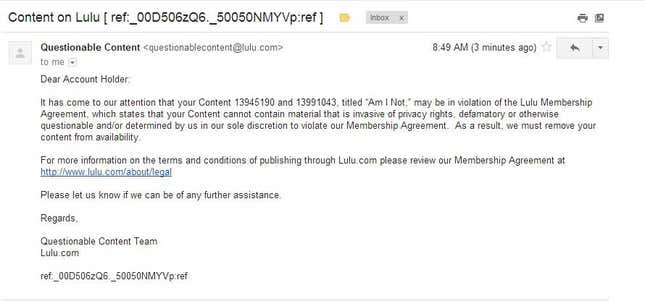Major eBook Publisher Sides With Alleged Pedophile
Latest

Thanks to leading eBook self-publishing website Lulu.com, 20-year-old Emily Kwissa was able to share her own account of surviving years of domestic violence and sexual molestation at the hands of her former stepfather — the version that’s been doubted and ignored by doctors, lawyers, and other adults throughout her life. But when her abuser complained, Lulu quickly and impersonally removed her memoir from the site, even though Kwissa changed her ex-stepfather’s name and other identifying details to protect his privacy. Have you read that all-too-familiar story about silencing the victim to protect the offender?
According to Kwissa and her family, her former stepfather — dubbed “Jacob” in Kwissa’s memoir, Am I Not — sexually, physically, and emotionally abused her from age 3-7, as well as abused her mother and siblings, until they were able to escape him nearly a decade ago. Kwissa has spent the past few years putting herself back together, most recently by writing a detailed account about what happened to her and how she got through it. A former high school teacher, impressed by her memoir, suggested she self-publish through Lulu.com. Finally, Kwissa thought, she’d have agency over the past, and the potential to help other survivors of sexual and domestic abuse. Her riveting account sold over two dozen copies in less than a month; not bad for a first-time self-publishing college student.
A few weeks later, Kwissa’s 14-year-old sister told Jacob about the book during a heated email exchange, which Kwissa forwarded to Jezebel. “Well, if you didn’t molest me, rape Emily and my mother or physically and emotionally abuse [her brother], how is it possible that we all have such vivid memories of it all? Explain that to me,” she wrote. Jacob replied that all of their memories were lies. “My door is always open to you should you wish to use it in a positive manner, if that means you want to tell me off then so be it get it off your chest,” Jacob responded. “Get it out of your system it must be a terrible way to live having that much hatred towards someone or something specially when its something that is false.” Kwissa’s sister, enraged, told Jacob he should “order a copy of an interesting and detailed memoir called ‘Am I Not.'” On August 15th, three days after the email exchange, Kwissa received a form letter from Lulu notifying her that her book had been pulled due to its “questionable content.”

Kwissa wrote back in part:
Yes, my memoir does contain detailed memories of abuse that occurred when I was a child. However, the name of my abuser has been changed, and there are no characteristics included in the book that could be used to identify him. He has been told about the existence of the book, and because he denies any of the abuse taking place, he is upset that the book exists. This is his perfect right. It is not, however, his right to silence me. I have done nothing wrong.
I find it deeply unfortunate and ethically questionable that you have removed my book from availability without first asking me about the claims that were made against it. No one has suffered any defamation at my hands. By taking down my book, all you are accomplishing is the support of a man who abused me all through my childhood and has stalked and threatened my family through most of my adolescence and adulthood. I protected his identity. Do I not receive some protection? Does my right to free speech not stand, when I have gone out of my way to shield a man who has done wrong to me?
When Lulu sent her another impersonal form letter, assuring her that Lulu wasn’t making “a judgment as to the merits” of her abuser’s claim and noting she was “not prohibited” from publishing elsewhere, Kwissa told her friends and online community of survivors and supporters, who filled up Lulu’s Facebook page with incensed comments.
-

-

-

-

-

-

-

-

-

-

-

-

-

-

-

-

-

-

-

-

-

-

-

-

-

-

-

-

-

-

-

-

-

-

-

-

-

-

-

-








































